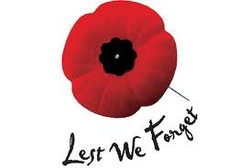
My parents’ generation was the same. My Dad was an army trainer; one uncle was in the corps of engineers who installed the artificial harbours that landed the invasion forces after D-Day; another uncle was a bomber pilot fighting in Burma and China; and my third uncle was a fighter pilot who had been shot down over the Mediterranean twice during his six year stint in the air force. Growing up in the 50s and 60s, those wars were still very much with us and there was an understanding of what had been at stake, and why people had put their lives on hold, or sacrificed them, to make the world a better place. Like television, our world was black and white.
By the time I was at university, things were a lot murkier. There had been a series of brief, but violent wars in the Middle East, the United States was mired in a questionable conflict in Viet Nam, and Canadians began more and more to see their role as peace-keepers with less of an appetite for the wholesale conflicts of our parents’ and grandparents’ youths. My classes were full of American draft-dodgers and even some deserters. There is no question but that my generation looked upon military service with disdain.
In the late seventies, my view of the world changed somewhat. I took a posting with the Canadian Armed Forces in Lahr, West Germany. A teacher, I spent my days looking at the roots of conflict with my history students, and two evenings a week, I worked with combat troops who were trying to finish their high school diplomas between military assignments. Many times my adult students would miss classes as they mobilized for training or to go to global hot spots where the calming influence of Canadian troops was required.
Over the ensuing decades, I saw my former students posted to Bosnia, Rwanda, and Afghanistan. To them it was a necessary job. To me, deliberately putting themselves in harm’s way for an ideal seemed almost beyond my ability to comprehend.
I am not a person who glorifies or idealizes warfare. I found this year’s “celebration” of the War of 1812 to be distasteful and missing the point. I was glad that we stayed out of Iraq and I wish that we had taken a different role in Afghanistan. I read in the papers about billions of dollars to be spent on jets, while, at the same time, our veterans are being nickeled and dimed on their pensions and even their funeral expenses. Our focus has become blurred by thinking about warfare as some grand human endeavour, while we forget about its human costs. To some extent it could be said of us that, like Robespierre, we “love mankind but care not for the lives of men.”
Having said that, I have been privileged during my life to have known some real heroes; in my family, among my friends, and in my students. They were, and are, people who were willing put themselves on the line to make a real difference in the world. They stood up to absolutism, to Nazism, and genocide. They fought for human rights, the environment, and racial and gender equality. They stood up against the bullies of the world and said “enough is enough”.
This week when we observe Remembrance Day, our students and even many of our staff will be asked to take a minute to remember people whom they never knew, people who sacrificed themselves in conflicts that our students may not have even heard of. They will be told stories about wars that have the same currency to them as the Civil War or the Battle of Hastings.
Let’s face it, these big stories are lost on all of us and lose relevance with the passage of time. But not the little stories – the individual sacrifices, the families who suffered loss, the necessity – especially in our cynical age – to stand up for your beliefs; to support your comrades; to put others before self - they should never be forgotten.
These are the timeless attributes of true heroism and they are well worth remembering.


 RSS Feed
RSS Feed
